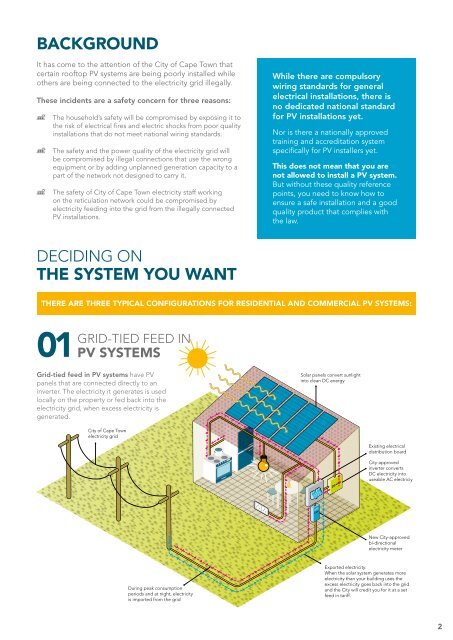SAFE AND LEGAL INSTALLATIONS
CCT-Energy-PV-Brochure-15032016
CCT-Energy-PV-Brochure-15032016
You also want an ePaper? Increase the reach of your titles
YUMPU automatically turns print PDFs into web optimized ePapers that Google loves.
Background<br />
It has come to the attention of the City of Cape Town that<br />
certain rooftop PV systems are being poorly installed while<br />
others are being connected to the electricity grid illegally.<br />
These incidents are a safety concern for three reasons:<br />
The household’s safety will be compromised by exposing it to<br />
the risk of electrical fires and electric shocks from poor quality<br />
installations that do not meet national wiring standards.<br />
The safety and the power quality of the electricity grid will<br />
be compromised by illegal connections that use the wrong<br />
equipment or by adding unplanned generation capacity to a<br />
part of the network not designed to carry it.<br />
The safety of City of Cape Town electricity staff working<br />
on the reticulation network could be compromised by<br />
electricity feeding into the grid from the illegally connected<br />
PV installations.<br />
While there are compulsory<br />
wiring standards for general<br />
electrical installations, there is<br />
no dedicated national standard<br />
for PV installations yet.<br />
Nor is there a nationally approved<br />
training and accreditation system<br />
specifically for PV installers yet.<br />
This does not mean that you are<br />
not allowed to install a PV system.<br />
But without these quality reference<br />
points, you need to know how to<br />
ensure a safe installation and a good<br />
quality product that complies with<br />
the law.<br />
Deciding on<br />
the system you want<br />
There are three typical configurations for RESIDENTIAL <strong>AND</strong> COMMERCIAL PV systems:<br />
Grid-tied FEED IN<br />
01 PV systems<br />
Grid-tied feed in PV systems have PV<br />
panels that are connected directly to an<br />
inverter. The electricity it generates is used<br />
locally on the property or fed back into the<br />
electricity grid, when excess electricity is<br />
generated.<br />
Solar panels convert sunlight<br />
into clean DC energy<br />
City of Cape Town<br />
electricity grid<br />
Existing electrical<br />
distribution board<br />
City-approved<br />
inverter converts<br />
DC electricity into<br />
useable AC electriciy<br />
New City-approved<br />
bi-directional<br />
electricity meter<br />
During peak consumption<br />
periods and at night, electricity<br />
is imported from the grid<br />
Exported electricity:<br />
When the solar system generates more<br />
electricity than your building uses the<br />
excess electricity goes back into the grid<br />
and the City will credit you for it at a set<br />
feed in tariff.<br />
2


